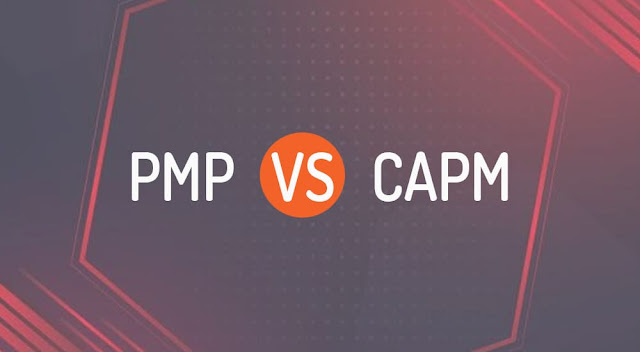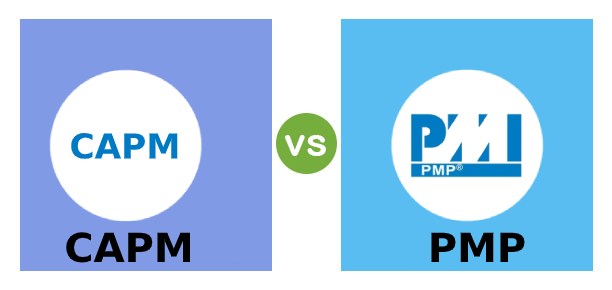In this post, I will explain PMP and CAPM certifications, the difference between these two certifications, their eligibility requirements, etc.
Let us get started.
PMP vs. CAPM
The PMP and CAPM certifications are offered by Project Management Institute (PMI), USA, and help professionals grow their careers in the project management profession.
Read More: PMI Certifications
The PMP certification was launched in 1984, while the CAPM certification came into existence in 2003.
Both certifications provide you with insight into project management and open new career opportunities for professionals working in project management.
Though the same institute offers both certifications in project management, the target audience for the PMP and CAPM certifications is different.
Before we move on to the difference between these two certifications, let us understand the PMP and CAPM certifications.
What is the PMP Certification?
The PMP stands for Project Management Professional and is for professionals who have experience in the project management profession. This certification is awarded after passing a rigorous computer-based examination in a controlled environment.
The PMP certification is valid for three years. To renew it for a further three years, you must earn 60 PDUs and report to the PMI.
Failing to do so will suspend your certification for one year. At this time, you must earn and submit 60 PDUs; otherwise, your PMP credential will expire, and you will have to re-apply again to become a PMP.
What is the CAPM Certification?
The CAPM stands for Certified Associate in Project Management. This certification is for professionals who have little or no experience in project management but are interested in building their careers in the profession.
This certification is awarded after a professional pass the computer-based certification exam in a controlled environment.
The CAPM certification is valid for three years. To renew it for a further three years, you must earn 15 PDUs and report to the PMI.
If you don’t submit these PDUs, your CAPM credential will be suspended for one year. At this time, you must earn and submit 15 PDUs; otherwise, your CAPM credential will expire, and you will have to re-apply again to become a CAPM.
Now that you know the PMP and CAPM certifications details let’s discuss the differences between these two certifications.
PMP vs. CAPM: Eligibility Requirements
Let’s start with the educational requirements.
The minimum educational qualifications are the same for both certifications. You must have at least a secondary diploma (high school diploma or global equivalent).
There is no difference between the PMP and CAPM certification regarding educational qualifications.
Now we come to experience.
The CAPM certification requires no experience.
The PMP certification requires project management experience according to your educational qualifications.
◉ If you have a secondary degree (high school diploma), you must have five years of project management experience in the last eight years.
◉ If you have a four-year degree, you must have three years of project management experience in the last eight years.
◉ If you have a bachelor or postgraduate degree, you must have two years of project management experience in the last eight years.
The last eligibility requirement for both certifications is formal project management education.
Both certifications require you to attend a training program regardless of your educational qualifications and experience.
For the CAPM certification, you have to attend a 23 contact hours CAPM training program, and for the PMP exam, you must attend a 35 contact hours PMP training program.
Note that if you are an active CAPM, you won’t have to attend a PMP training program; you can directly apply for the PMP exam.
PMP vs CAPM: Exam Fee
The CAPM certification exam fee is cheaper than the PMP certification exam fee.
The fee for the CAPM certification exam is 300 USD for non-PMI members and 225 USD for PMI members. If you fail the CAPM exam, the reexamination fee for PMI members is 200 USD and 150 USD for PMI members.
The fee for the PMP certification exam is 555 USD for non-PMI members and 405 USD for PMI members. The reexamination fee for PMI members is 375 USD and 275 USD for PMI members.
So you can say that the PMP exam is costlier than the CAPM exam.
PMP vs. CAPM: Exam Structure
The CAPM exam has 150 multiple choice questions, and the duration is three hours. The exam has no scheduled breaks. However, if you take a break, it will be counted towards your exam time.
But, if you are attempting the exam from home, no breaks are allowed. Even chewing gum is not allowed.
The CAPM exam will test your understanding of the PMBOK Guide. There is no negative marking, and each question carries one mark.
The PMP exam has 180 questions, and the duration is 230 minutes. In the exam, you will see four types of questions:
1. Multiple choice with a single response
2. Multiple choice with multiple responses
3. Fill in the blanks
4. Answer selection
The exam has three sections with two ten-minute breaks. The first break will appear after you complete the 60th question and review all of your answers. The second break will show up when you have completed the 120th question and answers.
Note that once you review your responses and start your break, you cannot return to the questions from the previous section of the exam.
When you come back after the break, you will have the remaining allotted time to complete the next part. In total, you will have 230 minutes to answer 180 questions.
The examination is preceded by a tutorial and followed by a survey, both of which are optional and can take 5-15 minutes to complete. The time taken by the tutorial and survey is not included in the examination time.
The PMP exam is based on the PMP exam content outline and tests your knowledge under real-world situations. There is no negative marking, and each question carries one mark.
PMI does not disclose the passing marks for PMP and CAPM certification exams.
PMP vs. CAPM: Certification Renewal
Both certifications require renewal every three years.
For the CAPM certification, you must earn 15 PDUs every three years and report to PMI to renew your CAPM certification for the next three years.
For the PMP certification, you must earn 60 PDUs every three years and report to PMI to renew your PMP certification for the next three years.
If you fail to renew your certification, your credential will be suspended for one year. At this time, you must earn and report PDUs to PMI. If you still don’t submit PDUs during this suspension period, your certification will expire, and to regain the credential, you have to apply for the certification exam again.
PMP vs. CAPM: Target Audience
The PMP and CAPM certification have different target audiences.
According to the PMI, “If you’re an experienced project manager, responsible for all aspects of project delivery, leading and directing cross-functional teams, then the PMP is the right choice for you.”
The CAPM certification is for professions with little or no project management experience.
According to the PMI, “Regardless of your career stage, the Certified Associate in Project Management (CAPM) ® is an asset that will distinguish you in the job market and enhance your credibility and effectiveness working on — or with — project teams.”
PMP vs. CAPM—Which One is Better?
These two certifications serve a different audience, so you cannot compare them.
Experienced professionals go for the PMP certification, and professionals who have just started their careers can go for CAPM certification.
If you don’t have experience in project management, you cannot apply for the PMP exam, and so your only choice is the CAPM certification.
But if you have the required project management experience, the PMP certification is the best option for you.
Here is where this post comes to an end. However, let us review a few FAQs before the conclusion.
A Few FAQ on PMP vs. CAPM
#1. Which exam is tougher?
Passing either of these exams is not easy. However, if you compare the difficulty level of the PMP and the CAPM certification exam, the CAPM certification exam is comparatively easier.
This is because the CAPM exam is based on the PMBOK Guide, and if you understand only one guide, you will pass the exam.
However, in the PMP exam, you will be tested against real-world scenarios and PMBOK Guide concepts, so it is tougher.
#2. Can I upgrade to the PMP exam from the CAPM exam?
Once you have earned the required experience, you can apply for the PMP exam. Being an active CAPM, you won’t be required to attend any training.
After applying for the exam, you will have to pass it.
There is no other concession except for the relaxation of the training requirements.
Source: pmstudycircle.com






0 comments:
Post a Comment